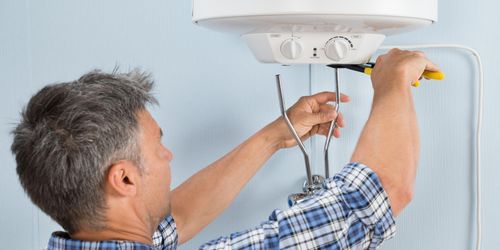They are making a number of great pointers relating to Is Your Water Heater Leaking? as a whole in this content in the next paragraphs.

A water heater is just one of one of the most essential standard home appliances that can be located in a home. With hot water heater, you don't require to go through the tension of home heating water manually every time there is a need to wash, do the laundry, or the meals. There is always an opportunity that your water heater would act up as with the majority of mechanical devices.
It is essential to note any type of little malfunction and tackle it swiftly before points leave hand. The majority of times, your water heater starts to malfunction when there is an accumulation of sediments as a result of continuous use. As a safety measure, periodic flushing of your water heater is advised to avoid debris buildup and also stop useful failing.
Common water heater emergencies and just how to manage them
Inadequate hot water
It might be that the water heater can not support the warm water demand for your apartment or condo. You might update your water heater to one with a bigger ability.
Rising and fall water temperature.
Your hot water heater could begin creating water of various temperature levels usually ice hot or chilly warm. In this situation, the first thing you do is to make sure that the temperature is readied to the preferred level. If after doing this, the water temperature keeps changing during showers or other tasks, you may have a faulty thermostat. There could be a requirement to change either the thermostat or the home heating system of your hot water heater.
Leaky water heater container.
A dripping storage tank could be an indicator of deterioration. It could create damages to the floor, wall surface as well as electrical devices around it. You can also be at risk of having your apartment or condo swamped. In this situation, you must switch off your water heater, permit it to cool off, and thoroughly look for the source of the problem. Sometimes, all you require to do is to tighten a few screws or pipeline connections in cases of minor leakages. Yet if this doesn't function and the leak lingers, you could require to employ the solutions of a specialist for an appropriate replacement.
Stained or smelly water
When this occurs, you need to know if the issue is from the tank or the water resource. If there is no amusing odor when you run cool water, then you are specific that it is your water heater that is malfunctioning. The stinky water can be caused by corrosion or the accumulation of microorganisms or sediments in the water heating system storage tank.
Conclusion
Some house owners disregard little warning as well as minor faults in their hot water heater device. This just brings about more damages as well as a possible complete failure of your device. You need to take care of your water heater mistakes as soon as they come up to avoid more expenses and unnecessary emergency difficulties.
With water heating units, you don't need to go through the stress of heating water by hand every time there is a demand to take a bathroom, do the washing, or the dishes. It may be that the water heating unit can not sustain the warm water demand for your home. Your water heating system could start producing water of various temperatures generally ice hot or chilly hot. If there is no funny smell when you run cold water, after that you are particular that it is your water heating unit that is defective. The stinky water can be triggered by corrosion or the buildup of bacteria or debris in the water heating system tank.
Common Water Heater Issues and What You Should Do
What Type of Water Heater Do You Have?
Before we begin it’s first important that you identify the type of water heater you have on your property. There are two main types of water heaters out there: conventional and high efficiency.
Both of these types of products typically use either gas or electricity to heat power. There are also solar water heaters that use a thermal collector on the roof or yard to heat the water.
While these models are not as common, they can cut heating costs in half. In this article, we will focus on conventional and high efficiency.
How Do My Electric and Gas Water Heater Work?
Though they look similar, electric and gas water heaters work very differently. It’s important to know their basic function because often problems can be specific to the heating source.
In the electric model, a thermostat on the side of the machine detects the temperature of the water in the tank. When the temperature needs to rise electricity flows to a heating element suspended in the water.
Gas models also use a thermostat device — typically with a mercury sensor at the tip and an additional sensor called a thermocouple. The thermocouple detects whether the pilot light is on and controls the flow of gas.
When the thermostat drops below the appropriate level gas is released which becomes ignited by the pilot light. The flame heats the bottom of the water tank which causes hot water to rise and cold water to drop.
This natural circulation continues until the water reaches the desired temperature. Then, the thermostat triggers the gas control valve to shut off the flow of gas.
What Are the Most Common Issues and How Do You Fix Them?
https://happyhiller.com/blog/common-water-heater-issues-and-what-you-should-do/

Hopefully you enjoyed our excerpt about Is Your Water Heater Leaking?. Thanks for finding the time to browse our blog. For those who enjoyed reading our post please do not forget to pass it around. Thank you for taking the time to read it.
Go Deal Now